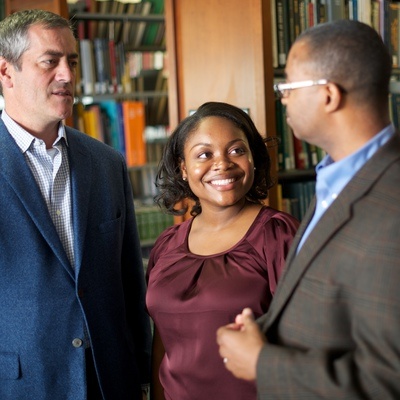When students complete a degree in accounting at the University of Iowa Tippie College they are armed with knowledge, experience, and a practical business foundation to prepare them for a career that lies ahead.
To ensure career success, graduates must be prepared for a global and inclusive workplace as well.
The department’s initiative enables students in the Master of Accountancy Program to have a transformational experience, providing valued professional development and growth. Participating students interact closely with tenure-track faculty and have the opportunity to incorporate flexibility in their courses. The program is individually tailored to provide students with the opportunity to take additional courses of interest, whether they be law, MBA, or other graduate courses.
“It is the socially responsible thing to do, and smart economics,” says Doug DeJong, professor and departmental executive officer. He says developing a more inclusive student body not only reflects today’s workplace but better serves the needs of students and the accounting profession.
“Throughout the accounting profession, there is a shortage of talented, diverse candidates. There is a pool of talent out there and they can and should be brought into the field,” he says.
“Our priority is to deliver a program that provides all graduates with competitive advantages and improved skill sets for their professional careers. We can then provide graduates with significant placement opportunities in their chosen field,” says DeJong.

With support from Professional Accounting Council (PAC) members Greg Ellison, Steve Belyn, Chris Hoffman, and Bob Hickman (former PAC member), great effort has been made to recruit talented African-American students with undergraduate degrees in accounting with plans to expand the program to all minorities.
Belyn sees the initiative as a win-win for all. “Students want a more diverse student body because they view it as a way to strengthen their learning,” explains Steve Belyn, managing director, FTI Consulting in Chicago.
“Firms look to schools for a strong pool of job candidates, but firms also realize their organizations should reflect their client’s organizations. Once it is further established, this initiative will develop the strength of the accounting program overall and really benefit the students at the same time,” Belyn says.
PAC members have been instrumental in developing a pool of talented, qualified candidates and introducing them to the Tippie College.
For example, Belyn meets with prospective candidates in the Chicago area and has shared his personal perspective on the accounting program, encouraging them to explore the opportunities awaiting them at the Tippie College. Further plans are developing to grow relationships with high schools to promote the Department of Accounting and the initiative engage potential students earlier in their college search.
Fellowships offered through this initiative include a competitive package that covers many of the students’ expenses for the additional years of study. The fellowship provides an opportunity for students to serve as teaching or research assistants, too.
Paul (a 1959 accounting graduate) and K. Wentzien (Bachelor of Arts 1961), were the first to support the Fellowship Program by donating funds to begin this initiative. Their financial gift helped to spark the recruitment of a more inclusive student body for the Master of Accountancy (M.Ac.) program. In addition to the Wentzien’s donation, the Department of Accounting provided an initial investment to launch the fellowship program.
These are crucial first steps in building a global and inclusive student body and our intentions are to make the Fellowship Program permanent in the M.Ac. Program. The continuation of the Fellowship program requires two critical components: the flow of qualified fellowship candidates and continued financial support of the program.